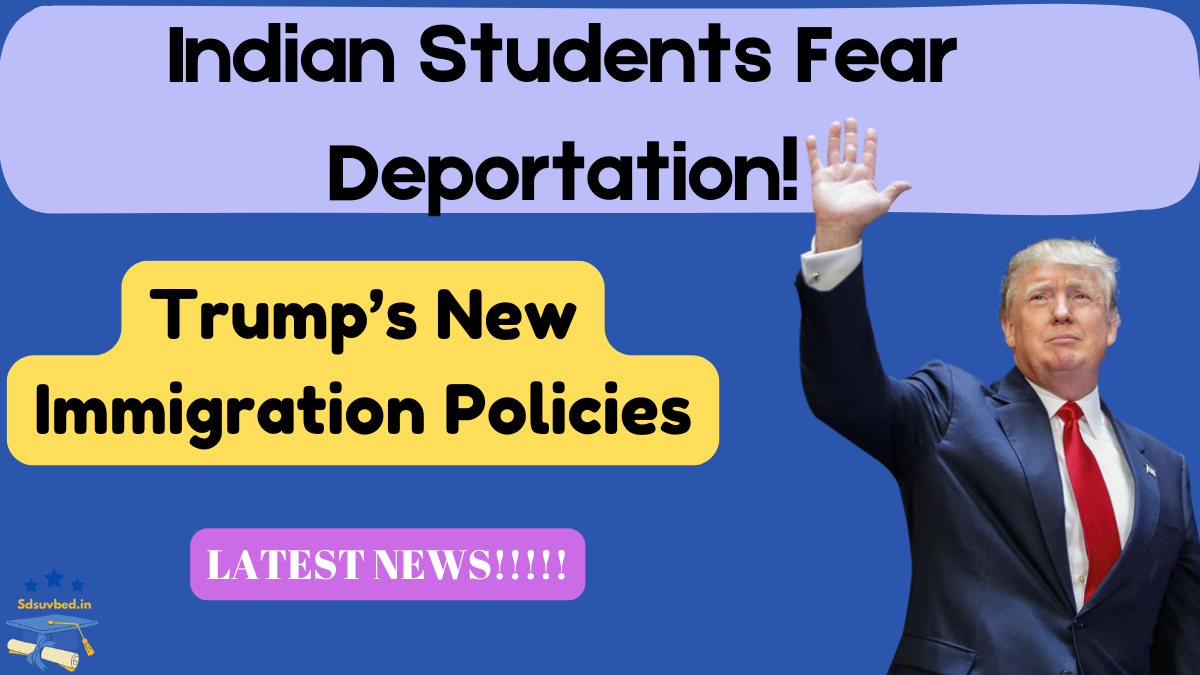Amid fears of deportation and visa cancellations, Indian students studying in the United States have started quitting their part-time jobs. With President Donald Trump’s administration signaling stricter immigration policies and tighter enforcement of rules, these students are prioritizing their visa status and future over supplemental income. For many, these jobs were a vital means of managing the high cost of living in the US, but the risks now outweigh the benefits.
The move comes just days after the president’s inauguration, with students concerned about the potential for random checks and stricter consequences for undocumented work. Many students have already taken substantial loans to study in the US, and losing their visa status would jeopardize both their education and financial stability.

Why do Indian students rely on part-time jobs in the US?
For Indian students, living and studying in the US often comes with significant financial burdens. Tuition fees, housing, groceries, and other living expenses quickly add up, making part-time jobs essential for many. While F-1 visa regulations permit international students to work up to 20 hours per week on-campus, many take up undocumented, off-campus jobs to make ends meet. These jobs often include roles in restaurants, gas stations, retail stores, and cafes.
A graduate student at a university in Illinois shared their experience:
“I worked at a small cafe after my college hours, earning $7 per hour. It helped me cover my monthly expenses. But after hearing about possible crackdowns on undocumented workers, I quit last week. With a $50,000 loan, I can’t take any risks.”
How are stricter immigration policies impacting Indian students?
The new administration’s focus on immigration reform has increased fear among international students. Reports suggest that immigration authorities may enforce tighter checks on unauthorized employment, putting students at risk of deportation or losing their student visa status.
A student pursuing a master’s degree in New York expressed their concern:
“There’s talk about random workplace checks. My friends and I decided to stop working for now. It’s hard, but we don’t want to risk deportation or jeopardize our education. My parents have already sacrificed so much to send me here.”
The uncertainty surrounding these policies has forced many students to give up undocumented jobs, even though this decision affects their ability to sustain themselves financially.
MUST READ: DOPPW Latest Update 2025: New Rules for Pensioners’ Digital Life Certificates
What alternatives are Indian students considering?
While quitting part-time jobs is a tough decision, students are exploring other ways to manage their finances. Some are relying more on their families for support, while others are reducing non-essential expenses to save money. Many students have decided to wait and observe any policy changes before making further decisions.
A graduate student from Illinois mentioned,
“I’ll reassess the situation in a few months. For now, I’ve stopped working entirely. It’s challenging, but safeguarding my visa status is more important.”
What has India’s response been to the new immigration policies?
India’s Ministry of External Affairs has indicated a willingness to cooperate with the US on immigration issues. External Affairs Minister S. Jaishankar recently confirmed that India would support the return of undocumented nationals affected by these policies. However, this development has added to the growing anxiety among students and their families.
Many parents back home are deeply concerned about the safety and future of their children. The financial sacrifices made to fund their education weigh heavily, making the current uncertainty even more difficult to bear.
READ MORE: EPFO’s New PF Transfer Rule 2025: Seamless Transfers Made Easy
What does the future hold for Indian students in the US?
The new immigration policies under the Trump administration highlight the precarious situation faced by international students. While many are hopeful that the situation will improve, others are prepared to make difficult decisions, including leaving the US if circumstances worsen. Until then, students are treading carefully, avoiding actions that could jeopardize their education or legal status.
FAQs
What types of jobs do Indian students typically take in the US?
Indian students often work in restaurants, cafes, retail stores, or gas stations to cover their living expenses.
What are the work restrictions for F-1 visa holders?
F-1 visa holders are allowed to work up to 20 hours per week on-campus but are prohibited from engaging in unauthorized off-campus jobs.
Why are students quitting part-time jobs now?
With the Trump administration signaling stricter immigration enforcement, students fear deportation and visa cancellations if found working unauthorized jobs.
How are students managing their expenses after quitting jobs?
Many students are relying on family support or cutting down on non-essential expenses to manage their finances.
Are students planning to resume work in the future?
Some students plan to reassess the situation in a few months, depending on changes in immigration policies and enforcement.
How is India responding to US immigration policies?
India has expressed a willingness to support the return of undocumented nationals affected by US deportation policies.
What risks do students face by working unauthorized jobs?
Students risk deportation, visa cancellation, and permanent ineligibility for future visas if caught working undocumented jobs.
How can students ensure compliance with F-1 visa rules?
Students should consult their university’s international student office and strictly adhere to work restrictions under their vis
A passionate content writer specializing in creating engaging, SEO-optimized content. With expertise in blogs, web copy, and storytelling, I craft words that connect with audiences and deliver results.
